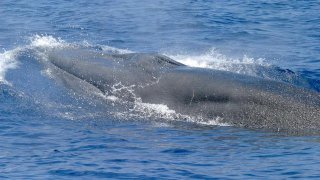
Federal officials’ rejection of a petition seeking to protect a rare whale species in the northeastern Gulf of Mexico has proponents saying the action leaves the endangered species “at risk of extinction.”
Hailing the denial of the petition, however, maritime leaders continued to object to a similar proposal regarding another whale species found off Florida’s east coast.
The National Oceanic and Atmospheric Administration Fisheries on Friday denied a request to implement a “vessel slowdown zone” in waters 100 meters to 400 meters deep from Pensacola to south of Tampa to protect Rice’s whales from collisions with vessels and noise.
“We have concluded that fundamental conservation tasks, including finalizing the critical habitat designation, drafting a species recovery plan, and conducting a quantitative vessel risk assessment, are all needed before we consider vessel regulations,” the agency said in a bulletin posted on its website.
Get South Florida local news, weather forecasts and entertainment stories to your inbox. Sign up for NBC South Florida newsletters.
Rice’s whales are protected under the Marine Mammal Protection Act and listed as endangered by the federal government.
NOAA said the agency was denying the petition “because we are prioritizing other conservation actions for Rice’s whales: finalizing critical habitat for the species, conducting additional vessel risk assessments, and developing a recovery plan for the species.”
The petition was filed by the Natural Resources Defense Council, Healthy Gulf, Center for Biological Diversity, Defenders of Wildlife, Earthjustice, and New England Aquarium.
Local
Members of the groups accused NOAA of “ignoring its own science” and “leaving the whale at risk of extinction in the meantime.”
“NOAA’s decision to kick the can down the road could cause the permanent loss of one of the Gulf’s most magnificent animals,” Healthy Gulf Coastal Organizer Christian Wagley said in a statement issued by the groups on Monday.
Michael Jasny, director of marine mammal protection at Natural Resources Defense Council, blasted the denial of the petition. Federal officials are “catering to the continuous harm perpetuated by oil and gas companies," he argued.
"If you want a good illustration of why we're in a biodiversity crisis, look no further than decisions like this," Jasny said.
In the petition, the groups contended about 50 Rice’s whales exist and it’s likely that more than one dies every 15 years as a result of a collision with a vessel. They also pointed to myriad other threats, including “curtailment of habitat due to oil and gas development, oil spills and oil spill response, anthropogenic noise, marine debris, and potential fisheries interactions.”
Rice’s whales are “running out of time,” Jane Davenport, senior attorney with Defenders of Wildlife, said in Monday’s statement.
“With approximately 50 individuals remaining on the planet, protecting this species could not be more necessary,” Davenport said.
Earthjustice has argued in a separate court case that the whales bask close to the surface and oil and gas seismic blasting interferes with their sonar used to communicate, care for their young, and find mates.
But critics of the petition maintain the proposed Gulf restrictions would have economically harmed ports from Tampa to Pensacola.
Florida Ports Council President and CEO Mike Rubin is one of the leading opponents of what he called a "fundamentally flawed" petition.
“We continue to request that NOAA Fisheries conduct an unbiased review of the initial findings on endangered species status and determine whether proper scientific analysis exists on the status and activities of these whales," Rubin said.
While applauding Friday's decision, advocates for maritime interests also pointed to a separate petition that seeks to expand boating speed limits to protect endangered North Atlantic right whales.
The Rice’s whale proposal “would have had dire implications on Gulf Coast communities, similar to what the proposed North Atlantic Right Whale Vessel Strike Reduction rule will do to communities along the Eastern Seaboard,” National Marine Manufacturers Association President and CEO Frank Hugelmeyer said in a prepared statement.
The Center for Biological Diversity, the Conservation Law Foundation, Defenders of Wildlife and Whale and Dolphin Conservation filed a petition regarding the North Atlantic right whales in Nov. 2022.
The petition said only about 340 North Atlantic right whales exist, and they are jeopardized by boat collisions off the coast of North Florida and other areas of the Southeast, the species’ only known calving ground. The calving season starts in mid-November.
A current rule requires vessels 65 feet or longer to slow to 10 knots or less to protect right whales in designated areas at certain times of the year. The petition seeks to set speed limits for vessels 35 feet or longer and expand the areas where they apply.
The right whale proposal “would create one of the largest restrictions of Americans’ access to public waterways, put families at risk on the water, and have a devastating impact on economies up and down the Atlantic Coast,” Hugelmeyer said.
“We will continue to engage NOAA and work with lawmakers on both sides of the aisle to find ways to protect the right whale that do not come at the expense of small businesses and American livelihoods,” he added.
U.S. Sen. Rick Scott, meanwhile, called the proposed Rice’s whale effort “short-sighted” and “burdensome.”
“For months, I’ve been calling on NOAA to reject this proposed rule, which was not based upon scientific research substantiating the proposed restrictions, and find a better way to look after the Rice’s Whale,” Scott said in a press release.
The Rice’s whale petition, filed in 2021, sought to implement a year-round, 10-knot vessel speed limit and other vessel-related mitigation measures.
The Florida Ports Council, however, countered that the petition would negatively impact more than a decade of efforts by the state to bulk up its international trade through its port systems.



